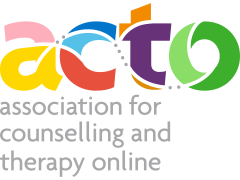
FAQ’s about membership
FAQ's around joining, renewing and upgrading membership
| Question | Answer |
|---|---|
| What training and experience do I need to become a member? | The minimum level face to face training we accept is a diploma. Whilst we don’t require potential members to have completed any post-training therapy hours we recognise that this is very useful in helping you consolidate your learning and experience within the therapeutic relationship. In addition we require all our professional members to have successfully completed an online training with an ACTO Online Training Provider. Your choice of course should meet the minimum ACTO criteria for qualifying courses https://acto-org.uk/acto-minimum-criteria-for-qualifying-courses/ and the ACTO competences for working online therapeutically https://acto-org.uk/acto-recommended-competences-for-counselling-and-psychotherapy-online/. Before signing up for a course we recommend that you check that your chosen online course meets these ACTO requirements by making enquiries with the training organisation. |
| When I become a member will I receive a copy of the ACTO logo? | On the acceptance of your application, an ACTO logo adapted to your membership level will be sent to you (except Associate or Student) which you are welcome to use on your website, blogs or other publicity materials. |
| How do I upgrade my membership from student to professional member? | Once you have established that you are eligible for an upgrade you can do this yourself. You log in to the website and then you edit your profile. Here you can upload your new diploma and if eligible fill in a directory entry. !!! When finished please do not forget to let the admin staff know that you have upgraded so they can check your documents. Your changes will not be live until a member of the admin team has reviewed them. |
| How do I know I am eligible for an upgrade? | Have a look on our upgrade page. There are examples and a table which you can check if you meet the criteria for the next level. |
| I previously completed an online counselling certificate with an online training provider some years back, and I was wondering whether this would be suitable to become a member of ACTO. | ACTO has minimum training standards and a set of competency criteria for those wishing to be on our professional register. For professional membership we will need to see sight of a certificate that sets out the number of hours, formats included. If this cannot be demonstrated, the applicant will be able to join as a student or associate member. We also offer a possibility to ACTO professional membership via the grandparenting route. Please email us for more information. |
| I have a face to face supervisor, do I need an online supervisor? | There is no doubt that having a trained online supervisor will be of benefit. However neither BACP or ACTO insist that you have a trained online supervisor but suggest that some of your current supervision is done through similar technology that’s used for working with clients and advise to have a trained online supervisor to do this with. BACP Working Online Guideline 047, states: Point 3 “It is considered good practice to receive at least some supervision online through similar technology to that used for working with clients …” (Bond, 2016 BACP online guideline) ACTO Code of Ethics: “Members should be aware of and work within their limitations and competence; seeking regular supervision preferably from an experienced online supervisor; and be willing to undertake continuing professional development.” We therefore recommend that at least part of your online therapy work should be explored in online supervision and preferably with an experienced online supervisor. If you need help to find an online supervisor you can find a list of registered online supervisors here. |
| I am working therapeutically, is there anything I need to check with my insurer? | Not all insurers are the same. We did a secret shopper survey in 2014 and we found a huge variation with regards to working online and some insurers didn’t seem to understand some of the issues involved, especially around jurisdiction. If you are working online we would suggest you contact your insurer to insure that you are covered to work online and if you’re working outside the UK to check that the country where your client is (or where you are) is covered by your insurer. Get confirmation of this in writing. I have clients in The States, my supervisor has told me this is not OK. Is she right? Generally how does it work if your client is in a different country? This subject is known as jurisdiction. As the question covers the USA specifically I will start with the USA where there are specific issues. There are two issues to think about when working in the States online. HIPAA and State Licenses. There is an American online therapist, Roy Huggins, who runs a really interesting company and website https://personcenteredtech.com/ ….. you’ll find plenty of resources there and Roy is a great person to consult. In brief, HIPAA (Health Insurance Portability and Accountability Act of 1996) is a United States legislation that provides data privacy and security provisions for safeguarding medical information. If you are going to work in the States you’ll need to sign up for this and comply with it. The second constraint is that most States require you to have a State license. This is for face to face work and online work. So to comply with US State laws you’ll need to be licensed in each State that you work in. You’ll understand from this that it is for this reason that most insurers do not include working in the States within their Professional Indemnity Insurance cover. To summarise it’s therefore HIGLY UNLIKELY that you’ll be able to work in the States unless you have the correct licenses and comply with HIPAA. If you want a second opinion on this Roy Higgins is your man! I have used the USA as the example, but each country has its own laws, and you should not assume that because we are in (just) Europe that all EU countries Have the same rules and laws, they don’t. It can be very difficult to get the information you need, for example if you have a child protection issue with an online client in Italy, how might you proceed. You still need to think about safeguarding and compliance wherever the client is and it’s not always easy. |
| The ICO, GDPR and Date Protection Registration, do I need to register? | We are not able to provide definitive advice which you would need to seek from the ICO as every situation is different. This is a fast changing area of legislation. General Data Protection Regulation (GDPR) is now well embedded with many consequences for the counselling profession concernbing the privacy of clients and their data. In addition the Electronic and Privacy Regulations will replace PECCA this year and create further headaches for us in the counselling professions. As a result we have revised our previous advice that registering for a Data Protection Registration Number (DPRN) which recommended completing the ICO’s (Information Commissioner’s Office) self-assessment to determine if your personal circumstances necessitate your registering. Following the most recent advice given by the BACP Good Practice in Action 047 – Fact Sheet – Working online in the counselling professions, article 7, “Legal requirements for working in the UK and Europe” we now join BACP in recommending everyone signs up for a DPRN with the ICO: “Anyone working online for any aspect of their work needs to take account of the relevant law concerning data protection. The General Data Protection Regulation and the Data Protection Act 2018 set out the legal requirements for anyone who processes data about people in the UK. The legislation aims to protect the privacy of people and to ensure that people, about whom information has been collected, can check the accuracy of that information. The main implications for the counselling professions include:
– see the ICO website |
| How can I get a DBS check? | There seems to be quite a lot of confusion generally about DBS checks. You cannot apply directly to the DBS Service but you can apply for your own DBS check here. Whilst there appears to be no fixed time validity, the generally available guideline is that a DBS should be valid for three years, and that’s the standard we recommend at ACTO. As soon as you receive your DBS check we would recommend you apply to have it registered here – you need to do this within 19 days of the date of your DBS certificate, but in future this will avoid you having any duplication. |
| My membership number has changed, is this an error? | No, our new database system has generated new numbers for all our members. |
| Resetting password problems | Please try logging in from another device which is not using the same router, ie. using mobile data rather than broadband or using a VPN. Alternatively, please wait an hour and then retry. |
